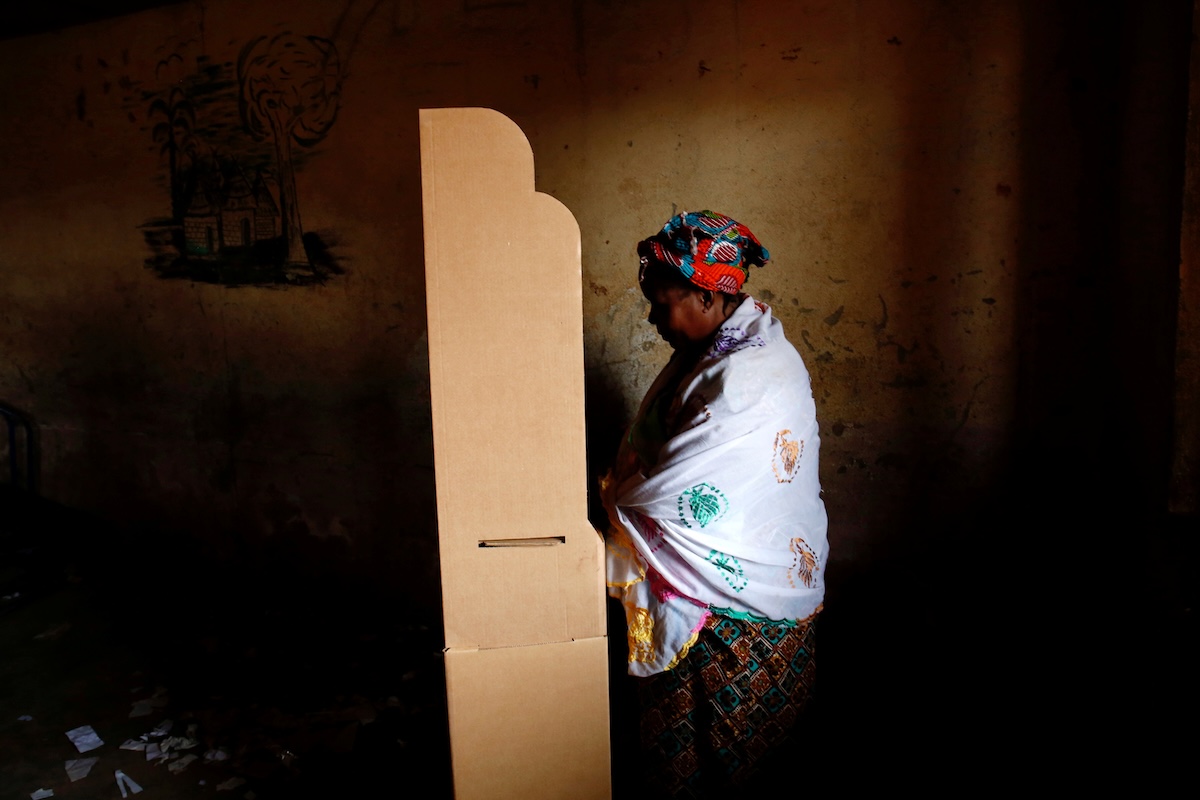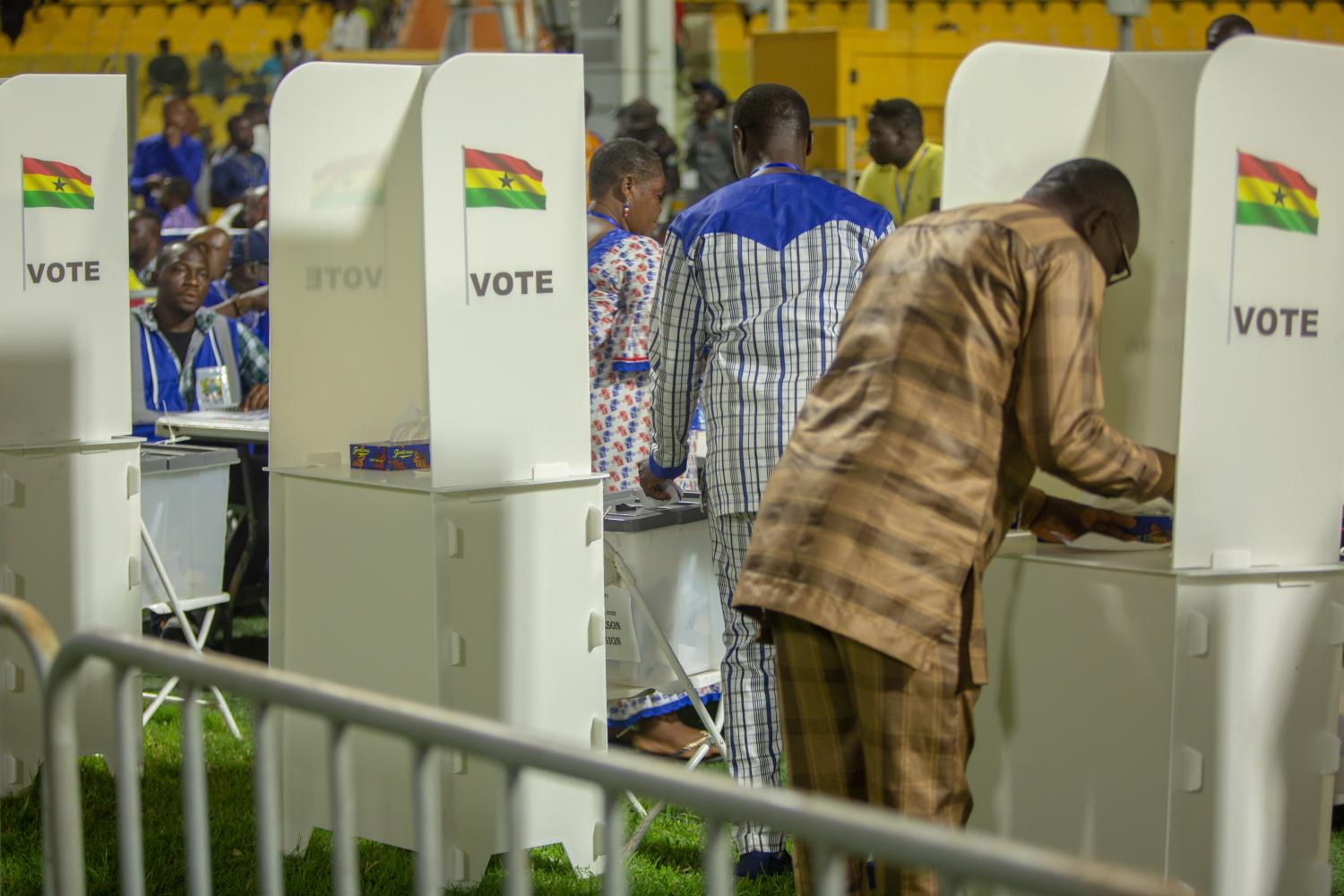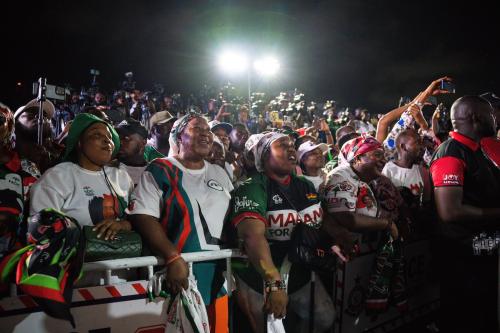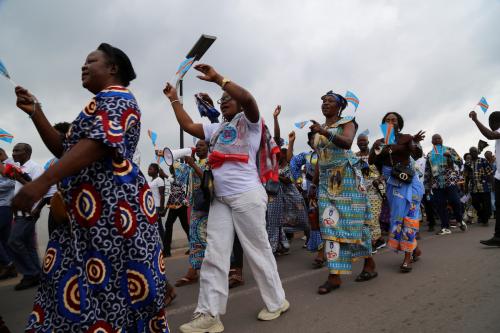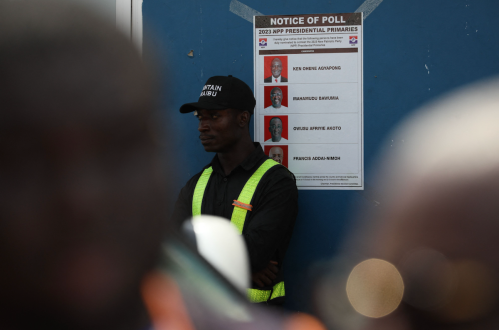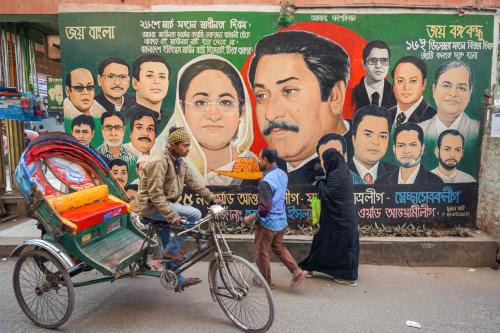This synthesis report is part of a project on the state of democracy in Africa. See our other works from this project.
Democratization in Africa is at a crossroads. On the one hand, there have been impressive strides in democratic deepening in recent years. For instance, after more than 60 years in power, the Botswana Democratic Party peacefully transferred power to the Umbrella for Democratic Change in 2024 (Dube, 2024). In the same year in Ghana, Mahamudu Bawumia, presidential candidate of the incumbent New Patriotic Party, graciously conceded defeat even before the official electoral results had been announced. Equally key have been moments when democratic crises have been averted via judicial efforts—such as in Kenya in 2017 (Freytas-Tamura, 2017) and Malawi in 2020 (Jegwa, 2020)—or through long-standing efforts of civil society activists, including in Zambia in 2021 (Resnick, 2022) and Senegal in 2024 (Yabi & Holman, 2024).
On the other hand, scholars have noted a more longstanding pattern of constitutional coups in the region, whereby leaders alter constitutions to change term limit, age, or nationality requirements to entrench their incumbent advantage (Mbaku, 2018). This is one tool of the broader phenomenon of democratic backsliding, where democratic systems are slowly hollowed out by manipulating elections, repressing opposition parties and media, and weakening the checks and balances that should be provided by legislatures and the judiciary (Bermeo, 2016; Cheeseman & Klaas, 2018; Levitsky & Ziblatt, 2018). Benin represents a quintessential example of this trend; once lauded as a forerunner of Africa’s democratic reforms in the 1990s, the country has experienced a precipitous democratic decline since 2016 due to repression of the media through disinformation laws, the use of the courts to target opposition parties, and amendments to electoral laws that reduce the scope of contestation at local, parliamentary, and presidential elections (Koter, 2024). Most worryingly, military coups—which plagued the continent prior to the 1990s—have made a resurgence. Since 2020, there have been 13 total coup attempts, eight of which succeeded (Mo Ibrahim Foundation, 2023), and these have truncated fragile democratic openings, especially across the Sahel region.
Based on these divergent trends, the Varieties of Democracy (V-Dem) project estimates that democracy levels in Africa have reverted back to their 2000 level (Nord et al., 2025a: 11). More specifically, of the 46 sub-Saharan African countries with data from V-Dem, the number of electoral democracies in 2024—15 countries—is equivalent to the number in 2004. During that 20-year period, however, only seven countries consistently retained their democratic status, while 27 countries remained autocracies. Of the remaining countries, five countries that were democracies in 2004 reverted to autocracies by 2024, while seven additional countries graduated to become electoral democracies.1 In sum, while overall levels of democracy on the continent appear stagnant, the region is experiencing vastly different regime trajectories. Moreover, within disparate regime types, there are multiple and simultaneous pressures to either facilitate or avert democratic backsliding in different domains. Free and fair elections may still be marred by a lack of party institutionalization, judicial independence may flourish even when legislatures remain rubber stamps, and, as argued by Rakner and van de Walle (2022), norms upholding gender equality might be espoused in political systems otherwise hostile to broader civil liberties.
What explains these different trajectories? What are the main contributors to democratic resilience? What are some of the tipping points that foster democratic resilience or entrench autocracy? And when does resilience morph into stagnation, failing to lead to more transformative political change? This paper addresses these questions by summarizing the findings from a Brookings Institution project on “The state of democracy in Africa: Pathways towards resilience and and transformation.” The project focused on five country case studies to better understand how distinct regime pathways emerge and why some countries—both authoritarian and democratic—remain relatively stable over time while others experience incremental improvements or deteriorations in specific political domains.
Specifically, we focus on three domains that are proxies for democratic resilience: vertical, horizontal, and diagonal accountability. Vertical accountability captures the mechanisms that allows citizens to hold leaders accountable, particularly through free, fair, and meaningful elections or political parties (Signé, 2018; Walsh, 2020; Lührmann, Marquardt, and Mechkova, 2020). Horizontal accountability refers to the ability of other branches of government institutions to hold governments responsive via checks and balances (Signé, 2018; O’Donnell, 1998; Walsh, 2020). The concept implies that government institutions are independent, and no agency or branch becomes too powerful compared to the others (Signé, 2018). Diagonal accountability captures the ability of non-state actors, including media or civil society, to hold governments accountable, connecting and enhancing horizontal and vertical accountability (Signé, 2018; Walsh, 2020). Such non-state actors promote the responsiveness of government by “educating citizens, denouncing wrongdoing, and providing innovative policy, societal, and business solutions” (Signé, 2018) and by organizing protests, information campaigns, and other forms of engagement (Walsh, 2020).
Across these three domains, we summarize how Ghana steadfastly remained an electoral democracy for the last two decades while Zimbabwe consistently has remained an electoral autocracy during the same period. Between these two extremes, other countries have experienced more movement. Most dramatically, Mali moved from being an electoral democracy to a closed autocracy in the wake of its 2021 coup. Throughout the last 20 years, Kenya has shifted multiple times between electoral autocracy and electoral democracy. The Democratic Republic of Congo (DRC) moved from being a closed autocracy without any elections to an electoral autocracy with flawed multipartyism during the same period. By using these five countries as archetypes of different trends—progression, stagnation, or decline—we can elucidate the binding constraints to, and enablers of, democratic resilience within Africa.
The following section elaborates on why a concentration on African democracy is warranted even though the issues and dynamics are relevant across the world. Subsequently, other recent literature on democratic resilience is examined. This is then followed by a description of the case study methodology and the reason for focusing on these particular five countries. Comparative lessons across our case studies are then presented, drawing on analyses from Batumike, Bauma, and Stearns (2025), Bleck and Soumano (2025), Ofosu et al. (2025), Otele, Kanyinga, and Mitullah (2025, forthcoming), and Tendi and Dendere (2025). Collectively, these studies highlight several key factors, including the importance of professional civil-military relations, the role of party structures, and the impacts of inequality, corruption, and security threats on citizens’ trust in democracy. The final section concludes by discussing avenues for additional research, including the legitimacy of Africa’s regional institutions in promoting good governance, the long-term impacts of civil society on democratic backsliding, and the shifting environment for democracy in the face of technological advances that can promote digital repression.
-
Acknowledgements and disclosures
The Brookings Institution is a nonprofit organization devoted to independent research and policy solutions. Its mission is to conduct high-quality, independent research and based on that research, to provide innovative, practical recommendations for policymakers and the public. The conclusions and recommendations of any Brookings publication are solely those of its author(s), and do not reflect the views or policies of the Institution, its management, its other scholars, or the funders acknowledged below.
This publication is supported by a grant from the Open Society Foundations.
Brookings recognizes that the value it provides is in its absolute commitment to quality, independence, and impact. Activities supported by its donors reflect this commitment.
-
Footnotes
- These trends are based on V-Dem’s Regimes of the World Index (which includes closed autocracies, electoral autocracies, electoral democracies, and liberal democracies) and more specifically, V-Dem’s polyarchy metric of electoral democracy. Typically, V-Dem considers a country an electoral democracy if the country scores 0.5 to 1 on its polyarchy index and has free and fair elections. The number of electoral democracies also encompasses liberal democracies (i.e. if a country is a liberal democracy, is by default also an electoral democracy but not vice versa). As of 2024, only Seychelles and South Africa were classified as liberal democracies.
The Brookings Institution is committed to quality, independence, and impact.
We are supported by a diverse array of funders. In line with our values and policies, each Brookings publication represents the sole views of its author(s).


